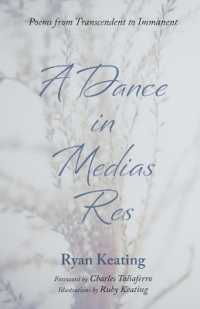- ホーム
- > 洋書
- > 英文書
- > History / World
Full Description
A wide-ranging history of the term "fascism," what it has meant, and what it means today.
The rise and popular support for authoritarianism around the world and within traditional democracies have spurred debates over the meaning of the term "fascist" and when and whether it is appropriate to use it. The landmark study Fascism: The History of a Word takes this debate further by tackling its most fundamental questions: How did the terms "fascism" and "fascist" come to be in the first place? How and in what circumstances have they been used? How can they be understood today? And what are the advantages (or disadvantages) of using "fascism" to make sense of interwar authoritarianism as well as contemporary politics?
Exploring the writings and deeds of political leaders, activists, artists, authors, and philosophers, Federico Marcon traces the history of the term's use (and usefulness) in relation to Mussolini's political regime, antifascist resistance, and the quest of postwar historians to develop a definition of a "fascist minimum." This investigation of the semiotics of "fascism" also aims to inquire about people's voluntary renunciation of the modern emancipatory ideals of freedom, equality, and solidarity.
Contents
Preface
Introduction: The Advantages and Disadvantages of "Fascism" for History (and for Life)
Part I: The Invention of "Fascism"
1. "Fascism" before Fascism
2. The Advent of "Fascism"
3. The Semantic Consolidation of "Fascism," 1922-1945
4. The Language of Fascism
Part II: Antifascists' "Fascism"
5. Contexts: The Global Reception of Fascism and the Invention of "Antifascism"
6. Liberals' "Fascism"
7. Marxists' "Fascism"
8. The Liberals' Genericizations of "Fascism"
9. The Marxists' Genericizations of "Fascism"
Part III: "Fascism" since 1945
10. Contexts: "Fascism" between the Postwar Era and the Cold War
11. The Search for a "Fascist Minimum"
12. Historical Knowledge and the Unbearable Fuzziness of "Fascism"
Conclusions: On the Advantages and Disadvantages of "Fascism," Again
Acknowledgments
Notes
Index








